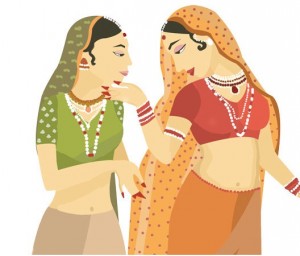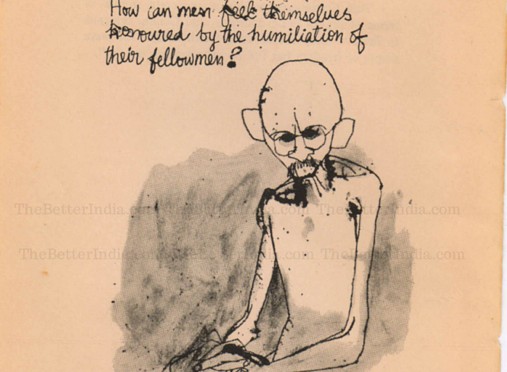By Diya Gupta, PhD researcher, Department of English – find her here.
“Choti yeh hai teri saanp ki hi lehar Dogana
Khati hun tere vaste main zahar Dogana
(This plait of yours is the wave of a serpent, Dogana
I take poison because of you, Dogana)”
– Lines from nineteenth-century Urdu Rekhti poet Insha Allah Khan
What do we know about the representation of same-sex romantic and sexual relations in early nineteenth-century north India? And how does this relate to the transnational realm of early twentieth-century democratic thought? A postcolonial conversation on recent publications by two outstanding postcolonial scholars revealed how love and desire, revolutionary ethics and aesthetics, connect these two worlds in the final King’s in Conversation with series for 2015/16.
Ruth Vanita’s talk on Gender, Sex, and the City: Urdu Rekhti Poetry in India, 1780-1870 and Leela Gandhi’s exploration of The Common Cause: Postcolonial Ethics and the Practice of Democracy, 1900-1955 attracted an audience from a wide spectrum of intellectual, artistic and academic pursuits to King’s. Drawn together in a ‘common cause’, to borrow Gandhi’s evocative phrase, they represented a range of universities and public institutions – King’s College London, LSE, SOAS, University College London, the Universities of Cambridge and Southampton, and the British Library. They included the current Leverhulme Artist-in-Residence at King’s, comparatists, postcolonialists, historians and students.
Why was this occasion compelling, and what made the room thrum with such intellectual energy? Vanita and Gandhi honed in on the granular – the rhetorical devices used by poetry to represent same-sex love, for example, and urban spaces as sites of eroticism – which then opened the door to broader political questions. How much do we know of the rich history of western anti-imperialism? Are the self and the world interconnected in the transnational scene of early twentieth-century thought? And can poverty function as ethical theatre?
Vanita discussed how Urdu Rekhti poetry represents women as urban pleasure-seekers and agents of desire, foregrounding the Indian city of Lucknow as a space inhabited by women. Although written mostly by men, Rekhti poetry revels in “women’s language,” and abounds with female personae. This “women’s language” was not simply spoken by women – it was the language of non-elites and was adopted by poets to represent an indigenous, pre-colonial urbanity. Contesting the traditional view of Rekhti as obscene verse written for male titillation alone, Vanita showed instead how this poetry celebrates polyamorous and same-sex love, and turns the female sexual gaze upon men.

Her readings from Rekhti poems also revealed how this poetry experiments with literary form. Characterised by traditional Urdu word play, the poetry evokes layers of meaning and suggestion through context.
The lines “Choti yeh hai teri saanp ki hi lehar Dogana/Khati hun tere vaste main zahar Dogana”, for example, displays such intricate verbal playfulness. Lahar, the word used here for “wave,” can mean an undulation, connecting the swinging motion of the choti or braid to the sinuousness of the saanp or snake. Lahar, however, can also mean “ecstasy” or “frenzy”, containing the sexually charged meaning of orgasmic convulsions. And the image of drinking zahar or poison as a consequence of love further reveals how such illicit passion can drive one to dangerous ends, even that of death.
Rather than representing sexuality as teleological or relationship-oriented, Rekhti then becomes the poetic medium with which to laud erotic love for its own sake. Vanita argued that its disappearance from the canon of Indian literature is due not only to its homoerotic content but also to an adoption of literary conventions drawn from non-Persian and Hindu sources. Indian nationalism in the twentieth century led to a more rigid identification of the Hindi language with Hindus and Urdu with Muslims. The hybrid use of such sources in Rekhti poetry were thus considered anti-Islamic by posterity.
… democracy was itself refashioned as a spiritual regimen of imperfectionism…
Moving on from the fascinating erotic and cultural world of nineteenth-century Lucknow, the audience entered the transnational realm of early twentieth-century democratic thought with Leela Gandhi’s talk. The Common Cause outlines her project as a new way of understanding the ethics of protest: “[…] in diverse anticolonial and antifascist quarters, many of them non-Western, democracy was itself refashioned as a … spiritual regimen of imperfectionism. This comprised aberrant practices of self-ruination, or an anti-care of the self, aimed at making common cause both with the victims and abettors of unjust sociality (by defending the former and reforming the latter).”
Gandhi examined how ideas of perfectionism and totalitarianism can often enter into an uncomfortable alliance, and how an alternative set of democratic practices, rooted in the idea of “moral imperfectionism”, arises in the first half of the twentieth century. Instead of seeing themselves as victims, colonised peoples start becoming custodians of the coloniser’s conscience as 1940s Europe, in their eyes, needs to be morally remade.
Gandhi described ‘the spirit of global scolding’ that develops out of colonial encounters…
Gandhi discussed how her book uses self-disregard as a structuring logic in the lives of four gurus, each from a different corner of India – Ramakrishna Paramahamsa, Mohandas Gandhi, Shri Aurobindo and Ramana Maharshi – and the European reception of these exemplary lives. She described “the spirit of global scolding” – a phrase the audience found rather entertaining! – that develops out of colonial encounters, where colonisers are seen as morally degraded by their unethical choices. Her focus was on inconsequential, everyday political acts that steer away from ‘grand narratives’ and seek not to matter. The talk questioned what place we make for imagination and the everyday in understanding the development of ideas, and aimed to transform fundamentally how we perceive empire and anticolonial feeling.
These tantalising glimpses into rich intellectual, ethical and aesthetic worlds were skilfully teased out by the chair of the event, Santanu Das. Discussing both books together revealed their shared focus, despite temporal differences. Gender, Sex, and the City and The Common Cause look at alternative spaces for loving, living and resisting – beyond heteronormativity and male desire, colonial subjugation and national borders. It is these representations of community and commonality that the audience took home with them.
The King’s in Conversation with speaker series started in 2015 with the aim of bringing postcolonial scholars to King’s, in dialogue with academics. Its inaugural talk was in December 2015 by Elleke Boehmer on Indian arrivals and networks of British empire. The series also collaborates with the Postcolonial Studies Network at King’s, which hosted Priya Gopal and Ankhi Mukherjee in 2015, and is co-convened by Anna Bernard and Ruvani Ranasinha.
Main image © Mickey Patel (1941 – 1995)
You might also like to read South Asians and the First World War: Reflections
Blog posts on King’s English represent the views of the individual authors and not those of the English Department, nor King’s College London.

